Traditional medicine has existed for over 1000+ years. Digital healthcare is a paradigm shift in this system. Primarily accelerated by the COVID-19 pandemic, it is a part of most clinical approaches due to infinite possibilities. Further, the introduction of AI has revolutionized the entire practice of virtual healthcare. For instance, recommender systems, which is a major application of artificial intelligence, is used to connect doctors with patients along with their relevant data like medical history and the current illness. This aids in providing personal care suggestions and reducing the human workload.
AI digital tools are also helpful to keep a record of new medical papers and journals that are expected to double every 73 days. However, using technology does not compromise the core values of facilities like examination, diagnosis, and treatment. So, there are no constraints but just linear advancements. Altogether, the digital healthcare market is thus expected to reach a revenue of $193.7 billion in 2024 worldwide.
Many medical companies are making the best use of this era. One such is Sword Health which is a virtual physical therapy startup app. It has emerged as Portugal’s first health Unicorn valued at more than $3 billion.
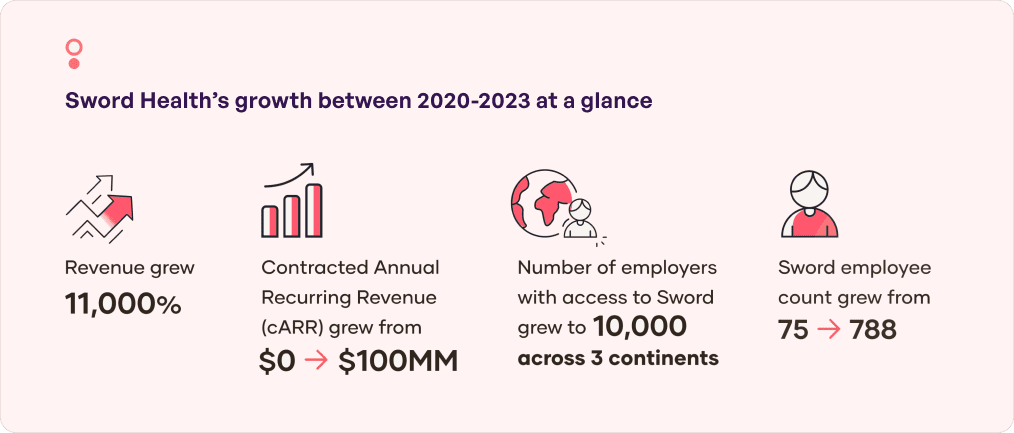 The estimated cost to build an MVP of such an app is between $80,000 and $150,000 while the full-fledged Sword Health-like mobile app development cost can be between $100,000 to $500,000. In this article we learn how you too can build something similar, or even a better one, to offer world-class care, make people feel better from the comfort of their homes, and amplify your business globally.
The estimated cost to build an MVP of such an app is between $80,000 and $150,000 while the full-fledged Sword Health-like mobile app development cost can be between $100,000 to $500,000. In this article we learn how you too can build something similar, or even a better one, to offer world-class care, make people feel better from the comfort of their homes, and amplify your business globally.
Table of contents
Factors that affect the cost of building an app like Sword Health
A few crucial factors shape the cost of developing healthcare applications. A glimpse into them is essential since it helps tweak the MVP and ensure proper planning. Further, consider each one lets you decide on the final budget. Read on to find out.
Tech stack
The top technologies that are used by expert developers are artificial intelligence, blockchain, IoT, and AR/VR. Plenty of other technologies like Java, Kotlin, Flutter, Azure, Oracle, and Puppet to name a few are used. These help take the app to the next level and help you stand out in the crowd of competitors. However, whether it is Sword Health app development cost or for similar apps, tech stack significantly impacts the expenses.
Complexity of features
The Sword Health app development cost is high since it has plenty of features as discussed previously, payment getaways, video calling facilities, newsletters, high-end cybersecurity, and most importantly, an integrated AI. Building a similar app that is rich in features and functionalities will incur significant charges. Otherwise, a simple medical app can be less expensive.
UI UX design
A combination of both makes an app functional and visually appealing. It also ensures desirability, adaptability, usability, and value that are the main pillars of UI UX design. However, the more complex the design is, the higher the impact on the cost to build a mobile app like Sword Health. So, it is viable to ideate a minimalist look and feel if you wish to lower the overall app development expense.
Platform
Building a cross-platform app is less expensive than building native apps for different operating systems. This is due to a reusable code, single maintenance effort, and uniform bug-fixing and updates rather than doing the same for iOS and Android, individually.
Data privacy
Robust application security measures help build a hack-proof infrastructure. We, at Simublade, understand this and thus offer detailed data backup, disaster recovery plan, multi-factor authentication, vulnerability management, data encryption, security patch management, incident response, and endpoint security. An advanced set of technologies are used with real time monitoring to ensure cyber threat intelligence. All of these will come at a certain price. Schedule a call with our AI app development company for a point of view.
What are the must-have features to develop a mobile app like Sword Health?
Features are the building blocks of any software, specially for apps where they are the core of excellent user experience. Ultimately, organizations can ensure better relationships with consumers. Further, incorporating artificial intelligence, like that of Sword Health, can be effective since 52% of customers are interested in AI that helps them through a product.
Below is a list of top features of Sword Health. All of these offer relief without having to step out for appointments. Have a look for a headstart in building apps similar to Sword Health to add value to your product and enjoy a competitive edge.
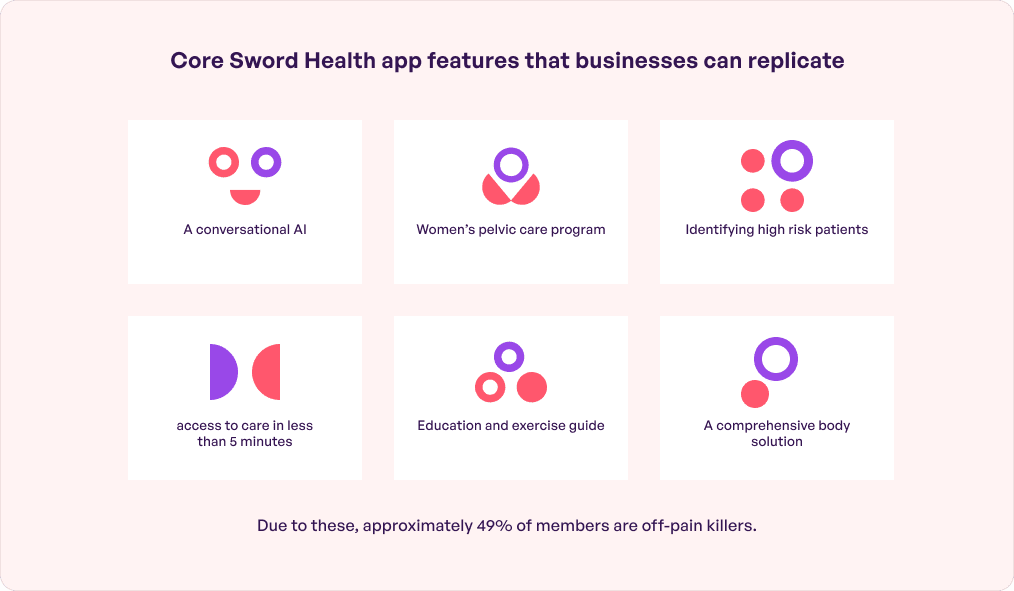
A robust conversational AI
The aim of Sword Health is to combine AI with clinical expertise. So, it has made the best of AI chatbots to develop Phoenix which is an interactive AI care model that replicates the work of clinicians. Wondering how the sessions work? Well, this is done using Thrive which pairs Doctors of Physical Therapy with Phoenix, which monitors and communicates with patients and offers real-time recommendations. This process prevents the risks of ER visits and surgeries which saves $3,012 per year.
Business can consider maximizing conversational AI too. The entire medical session would then be a data-driven approach and the performance metrics will carefully be measured by clinicians. However make sure the final approval is provided by doctors by accepting, rejecting, or editing the recommendations for an efficient decision.
Women’s pelvic care program
1 in 3 women are likely to experience pelvic floor disorders in their lifetime. Keeping this in mind, Sword Health has introduced Bloom. This program connects millions of women to personalized clinical grade pelvic care around the globe. A Bloom kit is shipped that includes an intravaginal device called the Bloom Pod by Elvie. This is paired with the app which helps specialists monitor the following in real time :
- pelvic pain
- bowel and bladder disorders
- sexual health complexities
- pregnancy and postpartum issues
- menopause symptoms
Doing the same, that is addressing women-centric issues, is an empowering move and will help businesses target niche audiences. You can also consider similar features for transgenders, seniors, and super-seniors keeping their needs in mind. For instance, routine screening access of prostate, breast, and pelvic areas for transgenders since these organs are vulnerable after the transition surgery. Try to keep this in mind while analyzing Sword Health app development cost or planning your own app.
Algorithms identifying high-risk patients
Predict leverages advanced algorithms and predictive AI to detect patients who require critical physical care. Embedding the same technology will influence the cost to develop an app like Sword Health. AI engines can be trained to detect complications and offer intensive support with the help of real physicians. This customized care prevents invasive procedures like steroids, drugs, and musculoskeletal surgeries. Predict typically targets the 4% of people who account for 80% of annual MSK expenses – a necessary move since musculoskeletal conditions are made of 150+ diseases impacting the muscles, joints, bones, and tissues.
Offering help in less than 5 mins
Sword Health understands that time-off from work, finding transport, booking appointments, and commuting altogether could be a laborious and inconvenient affair. This is especially true if patients are already in discomfort. So, the On-Call program offers access to pain specialists and their feedback round-the-clock in the app.
Businesses like you can replicate this feature along with keeping highly trained and experienced professionals in the loop. Make sure the session quality is not compromised despite a virtual treatment process since healthcare is non-negotiable. Organizations looking to develop a mobile app like Sword Health must carefully consider this to provide emergency care.
Global access to education and exercise
Approximately 51.6 million US adults, which is 21% of the American population, are dealing with chronic pain. Sword Health identified this and launched Atlas, a program that suggests educational resources against pain in the form of videos. These can help members live a pain-free and motivated life. Another section of Atlas offers scientifically-backed exercises for mobility and strength. The content is available in English, Spanish, French, and Portuguese. Users can also get access to Academy, another platform with short pain management videos from experts to reduce risks and form healthy habits.
A whole body solution for everyone
Regular physical activity is typically associated with low pain sensitivity. Tapping into this, Sword Health has tailored Move which offers best-in-class movement plans. This is inspiring and could be a fantastic feature to draw the general mass. Make sure compassionate doctors and AI join hands to offer personalized solutions on the app to avoid risks. Now, your app members can track their progress with their Apple Watch smoothly. You can build a device too which could sync with the application. This will help people receive continuous support and motivation to achieve their body goals.
Unique Sword Health features to integrate in your healthcare app
Besides the core features mentioned above, here’s a look at what businesses can consider. It helps create a unique app that increases the chances of adoption.
Safety and privacy
State-of-the-art measures are enforced to ensure private health information is protected. This cybersecurity is in strict compliance with HIPAA and other regulations. Sword Health app also checks if the AI is performing reliably to avoid data leaks. So, patients, employers and employees, and health plan providers can partner tension-free. The cost to build a mobile app like Sword will depend on this factor to a large extent.
Employer plan
Businesses can save thousands of dollars for their employees using the Sword Health program. This is because it is FDA-listed and has a significant patient engagement rate. Around 20 millions of sessions are already completed. People sign and finish the plan which is backed by personalized suggestions and easy-to-use technologies.
The result? Sword programs freed 64% of patients from pain and 43% of members no longer report productivity impairment. You too can achieve such industry-leading health outcomes and ROI by allowing an employer plan. Make sure the application is easy to use and the care therapies are offered by clinical experts and not health coaches.
Newsroom
The Sword newsroom includes blogs, PR, and news about new product announcements and company updates. Developing something similar, getting users to subscribe, and sending weekly newsletters can help businesses stay in the forefront of customers’ minds. Consider accounting this in your app budget since it will impact the cost of building apps similar to Sword Health.
Below are the steps to build an app like Sword Health for better clarity.
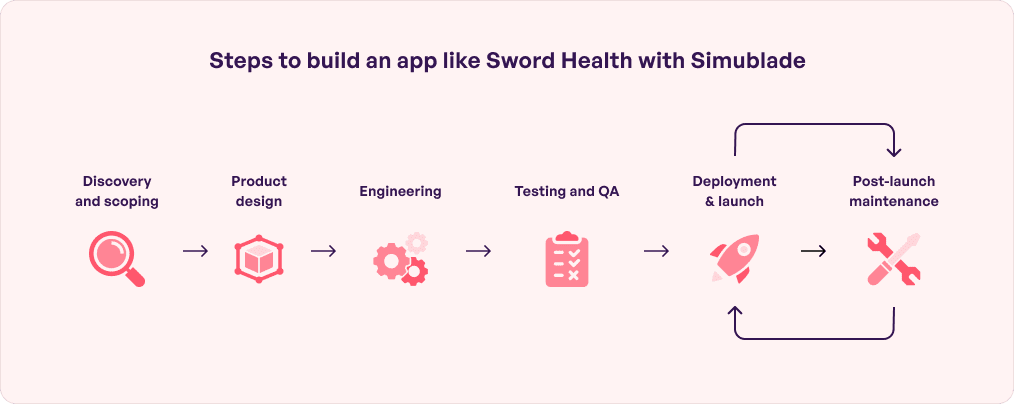 Sword Health provides care for neck, elbow, shoulder, lower-back, hip, knee, hand, wrist, ankle, headaches, and migraines. This comprehensive virtual process is especially helpful for the low-income and rural populations who do not have access to high-quality care. Sword Health works on the principle that ‘pain can’t wait and immediate access saves money.’ So, it ensures no individual has to compromise on their physical health with 24X7 easy access to its portal. Now, let us see the cost of building an app like Sword Health.
Sword Health provides care for neck, elbow, shoulder, lower-back, hip, knee, hand, wrist, ankle, headaches, and migraines. This comprehensive virtual process is especially helpful for the low-income and rural populations who do not have access to high-quality care. Sword Health works on the principle that ‘pain can’t wait and immediate access saves money.’ So, it ensures no individual has to compromise on their physical health with 24X7 easy access to its portal. Now, let us see the cost of building an app like Sword Health.
What is the cost to develop an app like Sword Health?
Sword Health is basically an American healthcare company that offers services via its app. The professionals here strive to provide treatment for chronic, acute, and post-surgical pain via an online platform. The cost to build something resembling the Sword Health app will depend on the complexity of the framework, platform type, size, region, backend and frontend infrastructure, features, functionalities, and the skills of the physicians.
Expect a healthcare app development cost to range between $100,000 to $500,000. The MVP development of such an app would be between $80,000 and $150,000. Embedding an AI will separately cost between $20,000 and $1,000,000 depending on how simple or complex it is. Here’s a breakdown.
Discovery and scoping
Estimated cost: $10,000 – $30,000
This stage will include brainstorming your ideas while checking market and technical viability. Sope definition, competitor analysis, and requirement gathering are also a part of this stage.
UI/UX design
Estimated cost: $20,000 – $50,000
Here, the design is finalized for a highly engaging, accessible, and intuitive app. Wireframing, prototyping, and visual design are further considered in this stage.
Development
Estimated cost: $100,000-$300,000
The frontend and backend development is done with the necessary tech stack.
Integration with medical devices and AI
Estimated cost: $50,000 – $150,000
Developers conduct integration with FDA-listed technologies and AI Algorithms.
Testing and quality assurance
Estimated cost: $30,000 – $70,000
The standards of functionality, security, and usability are tested using functional testing, security testing, unit testing, and compliance testing.
Deployment and launch
Estimated cost: $$10,000 – $20,000
This includes an app store submission checklist and integration with the legacy software which is finally followed by an initial launch marketing.
What is the cost of medical apps that address distinct health aspects?
Besides a comprehensive pain solution, a few businesses might wish to build apps that are focused on different health aspects. If that is your purpose, below is a list of costs for other types of medical-care apps than just muscular pain.
However, are you wondering how to kickstart? Introducing Simublade, an award-winning, trusted, and dedicated healthcare app development company in Houston, Texas. We can help you build each one of the below apps by transforming your concept into a market-ready product. This is because we understand the intricacies of the healthcare industry and ensure your remote patient monitoring, medicine delivery, health and fitness tracking, or checkup software is interoperable and secure. This aids in ensuring global success. Businesses can get in touch for a free consultation call for each of these app types.
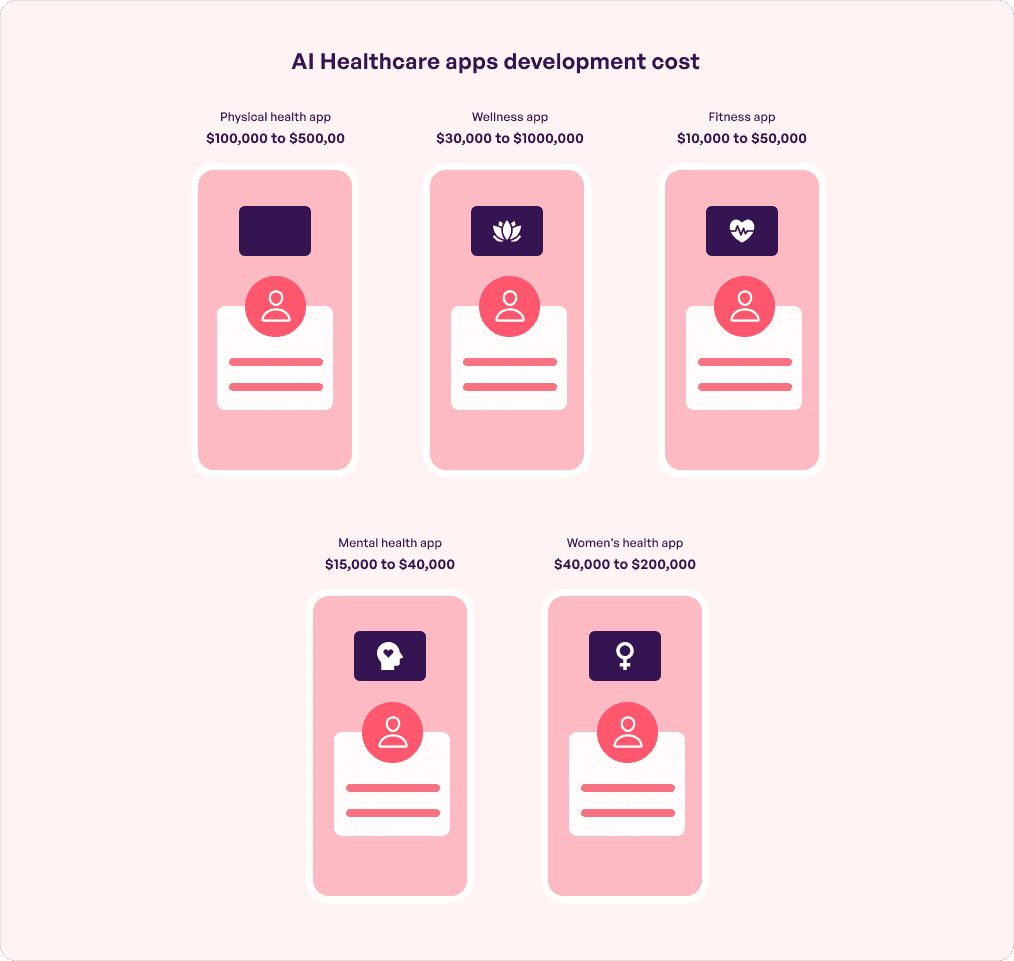
Physical health app
Estimated cost: $100,000 to $500,000
A telemedicine app like Sword Health comes with basic features like patient registration, appointment scheduling, video consultation, messaging facility, electronic health records (EHR) integration, personal dashboard, payment gateway, and geolocation. Overall, the cost of building an app like Sword Health will depend on how simple or complex you want to make it for consumers.
Wellness app
Estimated cost: $30,000 to $1000,000
A wellness app generally facilitates sleep tracking, water intake tracking, fitness, meditation, yoga, exercise progress tracking, step counter, heartbeat, glucose and oxygen level tracking, and physical risk assessment along with workout demos, nutrition suggestions, and general health coaching. Additionally, there are payment gateways, geolocation, offline mode, and educational guides for an end-to-end health solution.
Fitness app
Estimated cost: $10,000 to $50,000
These kinds of apps have features like activity tracker, steps counter, customized training plan, chatbots, self-care sessions, push notifications, and personalized interface to accommodate different types of end-users. One can also set fitness goals, snooze time, water marker, and robust gamification for a rich experience.
Nutrition app
Estimated cost: $30,000 to $60,000
Diet and nutrition apps can be for weight loss, weight gain, or for overall health plan. They usually help with nutritious food ideas, getting more exercise, planning a diet chart,and ultimately reaching your weight goals. Users are also allowed to monitor their eating behavior with frequent reports and analytics in the form of alerts. Further, a few dieting apps offer integration facilities with a wearable device to offer feedback in real time.
Women’s health app
Estimated cost: $40,000 to $200,000
These apps help women take better control of their bodies and build a healthy and strong version of themselves. So, they include features like menstrual cycle tracker, ovulation tracker, personalized pregnancy care routine, menopause symptoms management, pelvic care, and day-to-day habit tracker. In a nutshell, users can get an overview of their sexual, reproductive, and hormonal health under one roof.
Mental health app
Estimated cost: $15,000 to $40,000
A mental health app offers awareness content with tips and guidelines to keep your emotions, frustrations, and feelings in check. Users expect mood tracking, anger management,stress and anxiety control, and mindfulness, meditation, and sleep improvement ideas. Adding behavioral therapies and professional counseling opportunities can further improve the adoption of the app. Overall, these apps help with emotional and psychological happiness.
Additionally, businesses need to pay for maintenance which is typically 25% of the app cost annually. Further, there are charges for security updates, bug fixes, and app store fees. Get in touch with the best developers, like the ones in Simublade, for an estimation.
 We are a healthcare app development company serving customers universally. Clients trust our tech and digital experts to build user-first iOS, Android and PWA mobile applications that align with your business goals.
We are a healthcare app development company serving customers universally. Clients trust our tech and digital experts to build user-first iOS, Android and PWA mobile applications that align with your business goals.
With us, businesses can get EHR/EMR systems, remote patient monitoring software, telemedicine app development, compliance regulations integrations, and custom healthcare software development. This helps us serve doctors, hospitals, and labs worldwide. For instance, our expert developers had built Crowdtrace amid the COVID pandemic that ensured businesses could reopen by ensuring healthcare safety measures for employees.
Take a look at our vast scope of services that includes discovery workshop, UI UX design, app modernization, maintenance, and support. Further, we help in deploying artificial intelligence (AI) to boost your efficiency and productivity by 5X.
Developers build the app from scratch keeping all factors, risks, capabilities, possibilities, and limitations in mind. They also perform background research on the ethical and legal considerations of AI to stay updated with the existing laws and guidelines.
How does Simublade help reduce the cost to build a mobile app like Sword Health?
The first step would be to hire developers who are highly skilled, knowledgeable, experts in dedicated fields, well-experienced and passionate towards mobile app development. They must also have worked with a range of languages and frameworks for flexibility. We at Simublade, tick off these checkboxes and offer services starting at $9/hr to help you maintain your healthcare app development cost within your budget.
Despite the affordable cost, the good news is that we do not compromise on the quality of the project. The ultimate result of this fruitful outsourcing is a fail-proof innovative application.
Another good way we reduce the cost is by opting for cross-platform mobile app development. It requires a single codebase that runs uniformly on both iOS and Android. Getting native apps, on the other hand for both platforms, might not be cost-friendly.
Further, businesses can consider creating an MVP, cutting off unnecessary features and functionalities, getting a clickable prototype, and an overall careful budget planning. Fret not, we help in every aspect of this development journey. Our developers make sure the end-result is better than your competitors’, extremely future-proof, matches the existing industry standards, and ultimately exceeds customer satisfaction.
What legal compliance to consider while you develop a mobile app like Sword Health?
All healthcare apps must be in compliance with HIPAA, existing state, federal, and foreign privacy laws, HL7, SaMD, IEC 62304, HITECH, and FDA regulations. Further, the app might need an approval certification from the Federal Trade Commission’s Rules and Regulations. Our developers ensure that your software is closely aligned with each one. However, businesses must also have an idea of the law to prevent false claimants down the line.
Further, keep the following in mind:
- license agreement
- app store agreements
- trademarks and copyrights
It is a good idea to discuss with your chosen developers. The best ones would have complete knowledge to guide you in this process. It lowers the chances of legal repercussions.
In conclusion, the cost to build a mobile app like Sword Health need not be exorbitant. Proper conceptualization, budgeting, and MVP planning with adept developers at your side can ease the entire journey. Ultimately, your business comes across as a tech-savvy one and is able to target markets all across the world.
How to build a better app than Sword Health?
Sword Health app has successfully transformed the digital healthcare landscape. However, there are a few gaps which are not yet addressed. Let us identify them, find solutions to build a functionally efficient application, and stay ahead of the game.
Inclusivity
How would a physically challenged person, say someone who is visually impaired, operate the app to ensure pain relief? For this, screen readers, label buttons, and built-in sounds can be integrated. The idea is to consider building an all-inclusive application, something which Sword Health has not achieved yet. Work with developers who can suggest other features to make the app useful for every single individual, regardless of their ability type. Ultimately, not limiting the software to a particular market helps you tap onto a wider audience.
Mental health tracker
Consider adding a mental health management feature in the app which is currently missing in Sword health. It is of utmost importance since the prevalence of clinical depression in patients with chronic pain is 52% owing to the fact that hurting physically is partly an emotional experience. People tend to feel lonely, underconfident, and anxious due to compromised physical health. So, offer access to mental health healing programs for an overall well-being.
More languages
Further, increase the language options in your app. Sword Health currently offers its services in English, Spanish, French, and Portuguese. Consider adding German, Mandarin, Japanese, Chinese, Russian, Arabic, Bengali and Hindi. These are few of the most spoken languages in the world and will help you reach a wider audience.
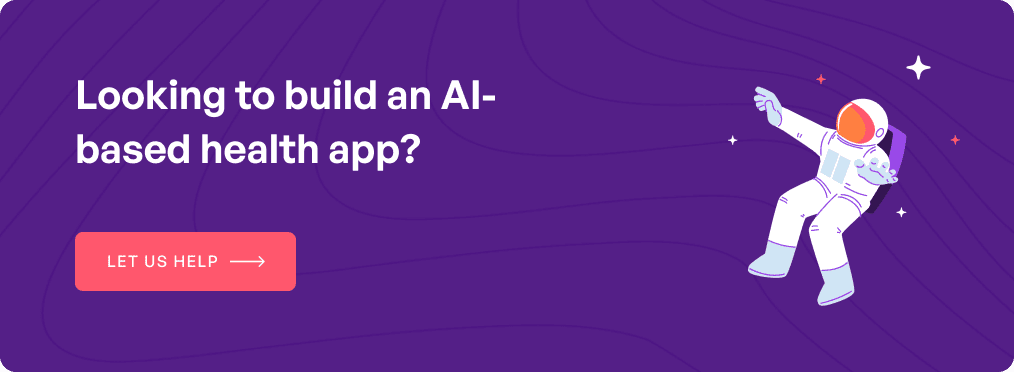 In conclusion, building a medical app is not just for your business reputation and revenue but also a step towards boosting public health and serving the community. So, get in touch with us at Simublade to see us in action as we fulfill your goals. Rest assured that our experts will build an innovative app which will bring your digital healthcare dream to reality.
In conclusion, building a medical app is not just for your business reputation and revenue but also a step towards boosting public health and serving the community. So, get in touch with us at Simublade to see us in action as we fulfill your goals. Rest assured that our experts will build an innovative app which will bring your digital healthcare dream to reality.
FAQs
Q. How much does it cost to build an app like sword health?
Ans. The cost of building an app like Sword Health is roughly between $100,000 to $500,000. The MVP can be priced at around $80,000 and $150,000. Lastly, AI integration will separately cost between $20,000 and $1,000,000. Further, maintenance, bug fixes, and security update expenses will be incurred annually or at certain intervals.
Q. How long does it take to create an app like sword health?
Ans. The time taken depends on the complexity of the steps to build an app like Sword Health. However, typically it takes 6 to 9 months to build a medical app
Q. How to build a healthcare app like sword health?
Ans. The best way to develop a mobile app like Sword Health is to outsource the project to trusted developers at Simublade. We follow steps like discovery, product design, engineering, testing and QA, deployment and launch, and post launch maintenance.
Q. What are the key factors that affect the development cost of a healthcare app like sword health?
Ans. To build an app like Sword Health, businesses must consider factors like tech stack, features, prototype, platform, UI UX design, data privacy, and the developers’ expertise.



